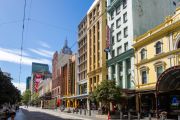
Build-to-rent sector faces wave of consolidation
The build-to-rent sector is facing a wave of consolidation even before it can take off, as surging costs and rising competition squeeze investment returns.
Major build-to-rent (BTR) developers and operators Mirvac, Greystar and Aware Super told The Australian Financial Review Property Summit audience this week that while prospects for the sector remained robust, its challenges were mounting.
Greystar Australia managing director Matt Woodland said operators who were unprepared to hold over the long term could be forced to exit the sector.

“I think it’s inevitable [to see consolidation in the sector],” he said. “I think people get into the sector and initially think that they want to operate these assets, but then start to realise it’s not as easy as it sounds.
“It’s people-intensive and it’s a difficult business. I think inevitably, some people will naturally look to exit, if they don’t have the longer-term capital backing them on their developments, or the capital is more opportunistic. So it presents opportunities from an operations perspective.”
Consultancy firm Charter Keck Cramer said consolidation of rental projects across Melbourne was expected in the next six to 12 months, “with the larger – and well-capitalised – players able to pick up projects that are no longer financially viable or able to raise the required capital.
“We have noticed various BTR projects pivot to build-to-sell or purpose-built student accommodation, or developers look to enter into joint venture arrangements or utilise fund-through models to proceed or exit the development,” the analysts wrote in a report earlier this year.
“This is a continuation of the ongoing emergence of this asset class where finance is testing the investment thesis of several platforms.”

Mirvac Funds Management chief executive Scott Mosely said uncertainty over the tax regime applied to foreign-owned projects would further deter foreign and domestic investors from putting money in the sector.
The government has promised to halve the withholding tax applied to foreign-controlled investment trusts to 15 per cent, bringing it in line with the tax rate applied to other forms of foreign-owned commercial property. However, proposed federal legislation to enable that is mired in political dispute and yet to be enacted.
“There’s no doubt that as a country, we’re in a competition for capital, and capital needs regulatory certainty. And so there has been a little bit of a pause, as some of the capital that’s already in industry, or actually looking to come in, waits to see how this legislation plays out,” Mr Mosely said.
“We absolutely need the right policy settings. The thematics are very clear that this sector is resilient and reliable once it’s operational, but we need those tax policy and development approval policy settings to be refined.”
Project starts slumped by 19 per cent in the past financial year to 5290 from 6543 a year ago, hit by rising construction costs and interest rates, according to Oxford Economics.
Charter Keck Cramer’s analysis shows the number of build-to-rent apartments in the approved, application and early planning stages in Melbourne has declined by 12 per cent in the past six months alone.
“The primary cause of this is the ability of developers to raise the required debt and equity capital to proceed with these projects,” the analysts wrote.
Aware Super head of property Alek Misev said adopting a flexible approach enabled the company to ride the current challenging environment.
“We started investing in 2017, and we’ve always taken a more flexible approach on how we look at sites, so instead of having just a BTR mindset, we look at a site and figure out what else we can do,” he said.

“This allows us to unlock value and then build affordable housing, but it’s always been a mix of something else, so that’s how we’ve been able to make it work.
“We also tend to buy from developers that need funding. We’ve done it in the past, and there are opportunities right now. Obviously a lot of developers are struggling, and there are deals that can be done with them where we can come in, provide the funding and develop something cheaper than what we would always be able to.”
Mirvac is also diversifying its rental offering by including more studio apartments in its future projects.
“We’re participating in a particular part of the market, and we’re finding ways to deliver affordable product as well. But that’ll evolve and having that in-house design and construction capability means that we can design a product to a price point, and it’s something that we’re going to lean into and evolve the product as it matures,” Mr Mosely said.
“Studios represent 20 per cent of the mix at LIV Munro and LIV Aston [in Melbourne] and they have proven popular as a more affordable option.”
LIV Anura, Mirvac’s first build-to-rent asset in Queensland and delivered in partnership with the state government, will offer 25 per cent of the development at a 25 per cent discount to market rent for essential workers.











